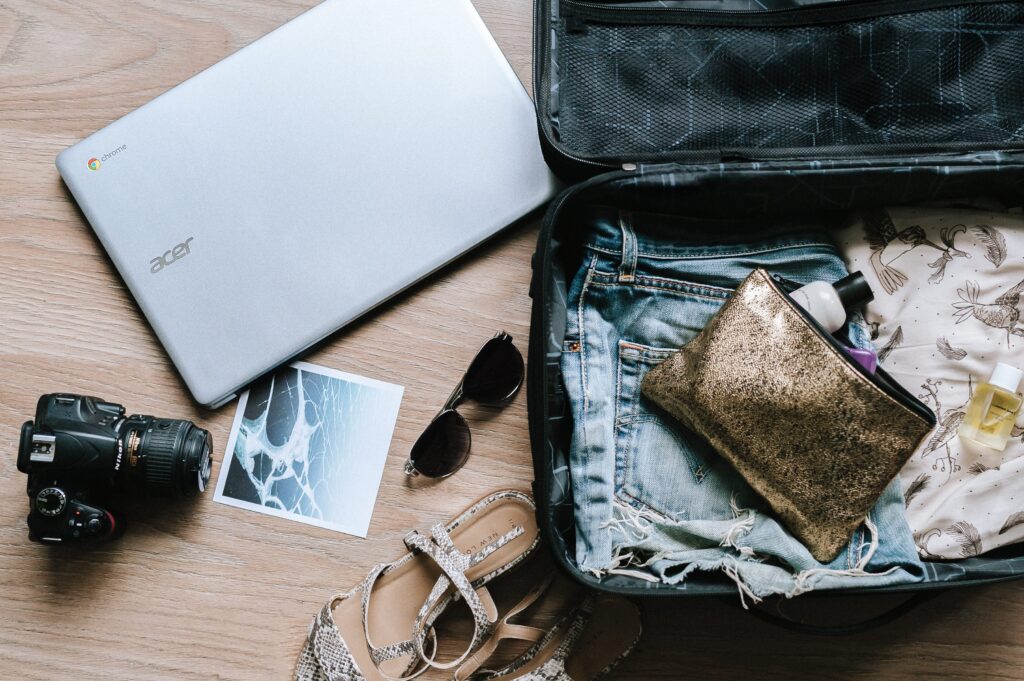In the digital age, our reliance on technology has grown exponentially, even while travelling. However, securing our tech while we travel is paramount since our devices store vast personal information, including financial details, sensitive documents, and login credentials.
Failing to protect our tech exposes us to various risks, such as identity theft, financial fraud, and privacy breaches. On the other hand, by prioritising the security of our devices, we safeguard our personal information, maintain control over our digital lives, and ensure a worry-free travel experience without compromising our privacy and data integrity.

Among other steps to protect your technology while travelling, one of the most effective ways is to use a trusted virtual private network provider in the UK (VPN) such as ExpressVPN. These types of tools encrypt your Internet connection and protect your data from prying eyes. They create a secure tunnel between your device and the websites you visit, ensuring your sensitive information remains private and confidential.
Of course, there are other practical tips for protecting your technology on the go, and this article will provide some that will become very handy to prioritise the security of our devices to protect personal information.
Update your devices and software, and use strong passwords
Before embarking on your journey, ensure that all your devices are up to date with the latest software and firmware. Regular updates are crucial in securing our tech while travelling, as they frequently include security patches that target known vulnerabilities.
This step is crucial as it helps protect your devices against potential threats and ensures that you use the most secure versions of apps and operating systems.
Similarly, strong and unique passwords are essential for protecting your online accounts, especially while travelling. Avoid common passwords and consider using a password manager, such as 1Password, to generate and securely store complex passwords for each account.
For enhanced security, enabling two-factor authentication (2FA) whenever available is recommended, providing an additional layer of protection. Following these practices minimises the risk of unauthorised access to your personal information, even if your device is lost or stolen.
Secure your connections and enable the “find my device” feature
When connecting to the internet while travelling, be cautious about using public Wi-Fi networks. These networks are regularly unsecured, making them vulnerable to hackers who can intercept your data.
In the survey conducted by the Forbes, it was found that people most commonly use public Wi-Fi in cafes and restaurants (38%), hotels (38%) and libraries (33%), which suggests that many people depend on public Wi-Fi while travelling and require a fast and convenient connection. Approximately 30% of respondents utilise public Wi-Fi at airports, posing a risk for travellers accessing sensitive data like flight details and passport numbers.
When utilising public Wi-Fi, it is advisable to employ a virtual private network (VPN) to encrypt your connection for added security.
Most smartphones and tablets have a “Find My Device” feature, allowing you to track and remotely erase your device if it gets lost or stolen.
Ensure that this feature is enabled on your devices before travelling. In case of theft or misplacement, you can use this functionality to locate your device or wipe its data remotely to prevent unauthorised access to your personal information.
Be mindful of physical security and backup your data
While protecting your tech against online threats is crucial, it’s equally important to consider physical security. Keep your devices with you at all times, especially in crowded public spaces or when using public transportation.
Avoid leaving your devices unattended, even for a moment, as they only take a few seconds to be stolen. Invest in a secure bag or backpack that provides additional layers of protection against theft and tampering.
Before travelling, ensure that all your essential data is backed up. Regularly back up your devices to an external hard drive, cloud storage, or a secure online backup service.
In case of loss, theft, or device failure, having a backup ensures that you can easily recover your data and minimise potential disruptions to your travel plans.
Protecting your tech while travelling is essential to safeguard your personal information and maintain a worry-free experience.
Our best advice is to implement these measures and stay informed to make a real difference in mitigating potential threats.
If you do, you can enjoy your travels without compromising the security of your valuable technology assets or, in other words, you can travel with confidence knowing that your technology is protected.

